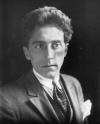Biography
Jean Cocteau (1889-1963) has been called the most versatile artist of the twentieth century, and in this case hyperbole has at least some basis in reality.
Born to a middle-class family in Paris, he excelled from youth in an almost absurd range of fields: filmmaking, poetry, graphic art, fiction, drama, couture, even postage-stamp design. Most of all, Cocteau was a brilliant, witty, self-invented personality whose talents put him at the forefront of practically every "ism" of the century, from surrealism to modernism to dada. The persistence of fairy tale, mythological, and other classical motifs in his work adds a gravitas a word Cocteau would no doubt bristle at, as being much too serious that makes it arguably unique in modern art.
While its hard at this point to judge the breadth of his achievement much of his work outside cinema is difficult to find his films have been consistently available as staples of the arthouse circuit, cine clubs, and classrooms devoted to the aesthetics of cinema. Cocteau was not prolific in this area: he made only six films over a three-decade period. Of these, four Beauty and the Beast and the "Orphic trilogy" stand almost sui generis as representatives of the poetic consciousness in cinema. The Criterion Collections recent release of the Orphic trilogy in a DVD boxed set affords a welcome chance to reassess these works that were a crucial part of many cinephiles introduction to the art of film. All three benefit from crisp digital transfers, restored sound, and new English subtitle translations.






